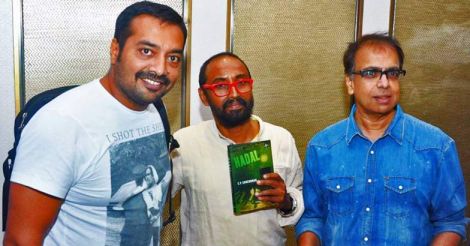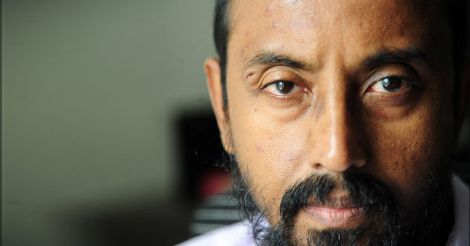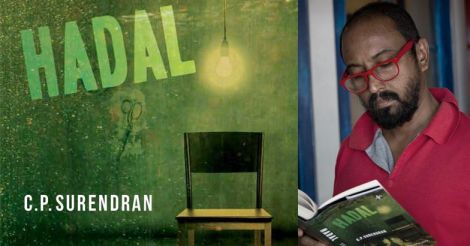C.P. Surendran's eclectic trysts with words made him traverse the realms of journalism, script writing, novels and poetry in varying degrees. And in India's big cities of Mumbai and Delhi. But it was in Kerala, his native place, that the idea of Hadal germinated from a real-life sham – the now infamous ISRO espionage case.
On the eve of the launch of Hadal, which the author terms “is not a docu-realistic effort at finding the truth of the ISRO scandal”, the noted journalist talks to Onmanorama about the trigger behind Hadal, the role of “minds that conspire at alternative realities” among sleuths, media, bureaucracy and politicians and much more.
Excerpts:
The many facets of a writer
Poetry, screenplay, fiction and journalism are linked rather intricately, though the formats are different. The connection is, in all these activities you must have something to say, which usually centres around your differences with the universe. The writer is essentially a solitary being because his substance, or 'thisness', is at variance with the moral majority.
On the failure of Marxism
A quarter of century ago, when I was columnist for the Times of India, I believed in Marxism, not just as an analytical tool, but as an agent of social transition. Marxism is one of the biggest failures of human imagination, as it turned out. In the process, it was instrumental in killing millions. Consider for example, the lives lost and the pain inflicted during the age of Stalin or Mao.
In fact, with not even a fraction of that social cost, capitalism in Nordic Europe for instance has delivered the welfare utopia to its people. I no longer believe in Marxism. I used to believe a little more in rights of women than now. I have changed because I realise that for a girl raped or a boy sodomised, justice is not in terms of gender. It is in terms of the efforts that society puts in terms of restoring their lost innocence. Justice is gender-transcendent.
On poetry, prose
But, no matter, what one’s beliefs are, the struggle to lose old ones and acquire new ones is what one will show in his work. It is these transformations that shape one’s evolution and connect with various formats of creativity. In short, the moulding of one’s word depends on one’s openness to experience. It’s a process of self-questioning, and his work will bear its stamp.
Poetry is different from prose, to my mind, because the former is essentially an inward journey. Prose is outward bound. Poetry is associative and cursive. Prose is more linear. Poetry can take resort to the magical qualities of vision and sound to resolve its crux. Prose is more dependent on the causative logic of its premises.
On screenplay
A good screenplay on the other hand, it seems to me, combines both. Each scene has its own images and sound and gesture to interpret the theatre of the human heart. In all, the economy of articulation is closely bound to the quality of risk the artist persuades himself to take, keeping in view the sum will be greater than its parts: a phenomenology of meaning, perhaps.
On Journalism
 CP Surendran (C) with Anurag Kashyap (L) and Anant Mahadevan
CP Surendran (C) with Anurag Kashyap (L) and Anant Mahadevan On Journalism, I shall not say much, because increasingly in India what you write is the daily iteration of a certain rite: the finding of the space on newspaper that does nor contravene the interests of the proprietor and the self. And very often the proprietors’ interests are co-terminus with the government’s for obvious reasons of survival.
'Gaur Hari Dastaan'
The first shooting script I did was for Gaur Hari Dastaan. It is based on Gaur Hari Das who lives in Bombay. He had fought for India’s freedom, and then had to fight for over 30 years against Indian bureaucrats for recognition as a freedom fighter. So then, he fought two freedom wars, one against the Brits and against India, as it were. When Anant Mahadevan approached me with the subject, I was not enthused. I found the subject dry. Gaur Hari Das in real life is a true Gandhian, a stoic super hero in his own right - A very good man.
The trouble with good is that it usually lacks conflict and drama as opposed to evil. Then Anant said simple things are the most challenging because you need to come up with a challenging and engaging storyline. After some hesitation, I began writing the script and put a little bit of my father (the late Pavanan, writer and rationalist) and a little bit of my life in other characters. And then finished the script in three months, I think. Unlike other forms of writing, film is a work you do with the director. You have to satisfy him, you can’t spring sudden surprises. And then you happily discover that great actors like Vinay Pathak or Ranvir Shorey or Thannishta or Konkana add to what you have written by a gesture or a pause and the movie comes out live like a fish in your fist, throbbing.
Hadal's filmi avataar
As for Hadal finding its filmy avatar, I guess in time it should happen provided there is a producer and director worth their salt. This is, I would like to believe, a very visual book, dramatically told despite the fact that it is literary fiction. I would also like to believe it tries to say something about us as a people, our great ability to inhabit vast fabricated spaces of our own making. We are natural great liars, as you might have guessed.
Trigger for 'Hadal'
I saw this Facebook passage from some Bengali poem or prose in translation of this man, a product of his night, who kicks a door open and grandly dominating the scene he comes up on. And thought this was the guy I want to write about because he was so us. I had been familiar with the ISRO story both as a reporter and a screenplay writer—in fact, I had a few months before beginning work on the novel done a rough treatment of the subject from the point of view of the much maligned scientist, Nambi Narayanan, who became a friend of mine in the process.
But in Hadal, I explore that dark world from the corrupt, prurient and imaginative perspective of the police officer responsible for the phantasmal land that the protagonists of the drama find themselves in.
The ISRO espionage case
The ISRO case may have happened a while ago. But Hadal is set in the world of today, of cell phones and computers. The world has gone on to become only more complicated and each man or woman a little more isolated than before despite the million stranger--friends with their thumbs always up in the social media. And more than ever, it is more career oriented and political, two great motifs of the novel.
Conspiring minds
I must it make it very clear here that Hadal is not a docu-realistic effort at finding the truth of the ISRO scandal. The world—and the word—in Hadal is about the how of the minds that conspire at alternative realities. It often treads the blurred line between dream and reality which is how we live though we may not have taken serious note of. I am conscious of the odd literal minded critic coming up with gems like the Barton Hill residence of Paul Roy (a character in the novel) in Trivandrum is not behind the actual public water works as described in the book. Or that Mariam is spelt as Miriam. Hadal is not about ISRO, it is about us, an attempt at mapping our minds. The characters are fictional, resemblance to any living person, as the cliché goes, is accidental.
The media's role
On the specific question of media apologising to the actual victims of the ISRO case: it is not just the media, is it? Politicians were involved. Bureaucrats. Investigative agencies. Also, an apology is nothing; it is just a gesture. The years the accused lost, or the damage to their minds, is not calculable, neither can that be compensated.
As far as I know, only Nambi got a token compensation of some Rs 10 lakh. What about Mariam Rasheeda? This country stamped her a spy and a sex commodity and locked her away in a jail for five years. I am not sure if anyone apologised to her. Certainly no one sent her a cheque. Best not to rake that up, I suppose. Or on second thoughts, why not?
On Miriam’s character

Miriam in fact is the moral centre of the novel. It’s her journey of self-discovery. At the end of the novel she is a much more evolved person. Her understanding of even her persecutors is much more complex and mature than the one they themselves display. True, the Miriam of Hadal is unfaithful to her husband. But that actually makes her into a full blooded person. The novel is partly an essay in understanding Miriam.
On his previous work 'Lost and found'
Lost and Found has not had found its audience. Semi-literate critics had a field day reading their idiocies into the novel. What I tried to do there was to invert a good number of Indian tropes: twins separated at birth; the intermeshing of reel and real life; the politics of the cow etc. One of the great problems of readers and critics in general is their literal mindedness. Finally a work is as rich as what we attribute to it. And that in turn depends on the finitudes of our imagination. To my mind, Lost and Found was too deceptive in its ironies. I suppose it could be also seen as the author’s failure. But I have a feeling the novel is one of those that will be rediscovered in time.
On his Bombay, Delhi stints
I no longer see Bombay or Delhi or Bangalore as actual cities. I have been in and out of these cities so many times, they are more like aspects of the mind. But each has a distinct literary character. Hadal is partly set in Delhi whose winterscape I have used to bring about a certain sombreness to the setting. Lost and Found is primarily set in Bombay, a city I love best at 4 am, when the roads and the deserted Marine Drive acquire a very dreamily real tone. All of it, not just the physicality of the landscape and the weather, but also what they mean to one’s heart, I hope, will find way to my work, whether is it journalism, poetry, movies or fiction.



































































































































































































































































































.jpg.image.160.84.jpg)





































































































































.jpg.image.160.84.jpg)










































 CP Surendran
CP Surendran
Disclaimer
The comments posted here/below/in the given space are not on behalf of Manorama. The person posting the comment will be in sole ownership of its responsibility. According to the central government's IT rules, obscene or offensive statement made against a person, religion, community or nation is a punishable offense, and legal action would be taken against people who indulge in such activities.